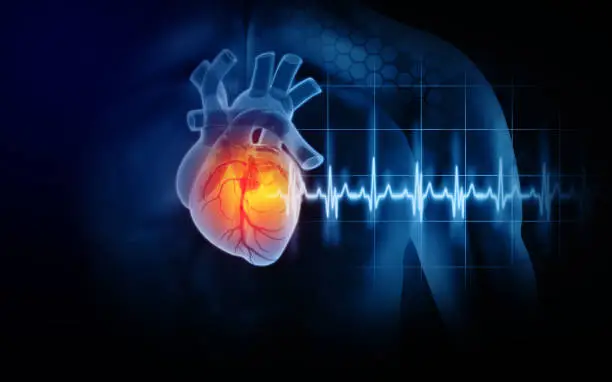Heart attacks, or myocardial infarctions, are major leading causes of death globally. Understanding the early symptoms of a heart attack and taking preventive initiatives can significantly mitigate the risk and improve results. This comprehensive guide inspects the symptoms, risk factors, preventive remedies, and the role of cardiologists in sustaining heart health. Moreover, getting regular check-ups done at the best heart hospital in Delhi is important to avoid situations like heart attack.
What is Heart Attack?
A heart attack is likely to occur when blood flow to a part of the heart muscle is blocked, usually owing to a buildup of plaque in the coronary arteries. This stoppage prevents oxygen-rich blood from reaching the heart, turning to tissue damage and potentially irreversible outcomes. While heart attacks can occur abruptly and without warning, they are often likely to happen with warning signs that, if recognised early, can prompt timely medical intervention. If these signs persist, patients must visit the best heart hospitals in Delhi or nearby cardiologists.
Early signs and symptoms of a heart attack
To be protected, it is important to check the early signs like:
- Chest discomfort: The most prevailing symptom of a heart attack is chest pain or discomfort. Pressure, squeezing, fullness, or pain that extends beyond the chest to the arms, back, neck, jaw, or stomach may be felt.
- Shortness of breath: Heavy breathing or sudden shortness of breath can occur with or without chest discomfort.
- Fatigue: Signs of fatigue, no energy, or light headache can be unavoidable symptoms, majorly in women.
- Cold sweats: Excessive sweating, often accompanied by clammy skin, can be alarming.
- Nausea and dizziness: Feeling dizzy or nauseous, along with signs of light-headedness, can point towards heart problems.
- Pain and discomfort in other areas: Pain and discomfort in the arms (in one or both), the back, neck, jaw, or stomach indicate heart stroke.
- Irregular heartbeat: Palpitations or Arrhythmias may cause feelings of skipped heartbeats.
Causes of heart attack in patients
Heart attacks are mainly caused by Coronary artery disease. This condition occurs when one or more of the heart’s (coronary) arteries are blocked. This happens due to cholesterol-containing deposits called plaques, which can narrow the arteries, reducing blood flow to the heart.
Not all heart attacks are caused by blocked arteries. Other causes include:
Coronary artery spasm: This is a severe squeezing of a blood vessel that’s not blocked. The artery generally has cholesterol plaques or early hardening due to smoking or other risk factors. Other names for coronary artery spasms are Prinzmetal’s angina, vasospastic angina, or variant angina.
Spontaneous coronary artery dissection (SCAD): This life-threatening condition is caused by a tear inside a heart artery.
Risk factors for heart attack
Numerous causatives are associated with increasing the likelihood of encountering a heart attack.
These consist of:
- High blood pressure: Hypertension increases the workload on the heart, which results in Coronary Artery disease.
- Smoking: Risk escalates with the consumption of tobacco, damages blood vessels, and leads to danger of Atherosclerosis.
- Diabetes: people with diabetes are more prone to developing heart disease.
- Family history: A history of heart ailments upholds the chances to get trapped in a heart attack.
- Obesity: Excessive weight on the body or morbid obesity, Diabetes, and Hypertension are major contributing factors to increase the risk of heart disease.
- Physical inactivity: Living a sedentary life and not doing physical activity are causative factors in developing heart disease.
- Stress: Chronic is an integral factor that causes heart diseases indirectly through behaviours like overeating or smoking.
How to prevent heart attack?
Preventing heart attack needs a heart-healthy lifestyle and controlling risk factors efficiently.
Lifestyle changes
- Healthy diet: Consume a balanced diet enriched with fruits, vegetables, whole grains, and lean proteins. Cut down on saturated fats, trans fats, sodium, and added sugars.
- Regular exercise: Aim to complete 150 minutes of intense physical and aerobic activity per week, such as brisk walking, cycling, or swimming.
- Maintain a healthy weight: maintaining and accomplishing a healthy weight by having and doing a healthy diet and regular exercise, respectively.
- Quit smoking: Smoking poses a high-risk factor for developing heart disease.
- Limit alcohol: Consumption of alcohol should be in moderation. Excessive consumption can cause hypertension and other risk factors.
Medical management
- Monitor blood pressure and cholesterol: The best heart doctor in Delhi will definitely help you check your blood pressure and cholesterol levels.
- Manage diabetes: Blood sugar levels are to be kept under control through diet, exercise, medication, and regular monitoring.
- Medicines: Medicines such as aspirin, statins, beta-blockers, or ACE inhibitors may be prescribed to control cholesterol and prevent blood clots, depending on individual risk factors.
- Regular medical check-ups: Regular checkups with a heart doctor in Delhi or any other location are suggested to assess overall health and probe concerns.
Individuals decrease their risk of encountering a heart attack or any other heart diseases by being aware about their own health conditions and having regular heart checkup. In Delhi, with its worldwide medical facilities and specialised cardiologists in Delhi, top heart care is accessible, ensuring timely intervention and optimal patient results.
By categorising heart health through awareness, proactive healthcare, and collaboration with cardiologists, people can live healthier lives and minimise the pressure of cardiovascular disease in their societies. Taking charge of heart health today can pave the way for a healthier tomorrow.








